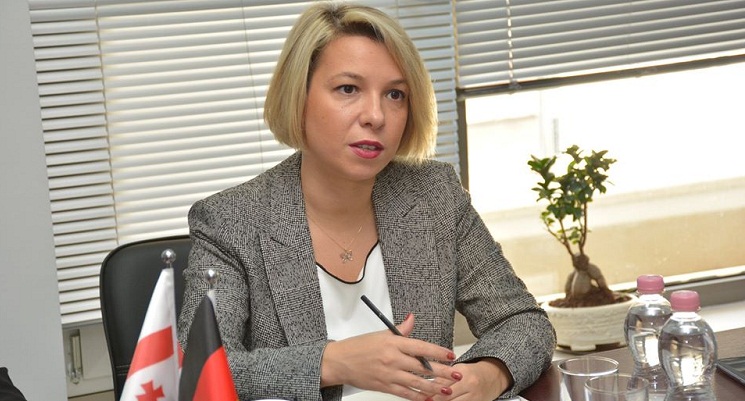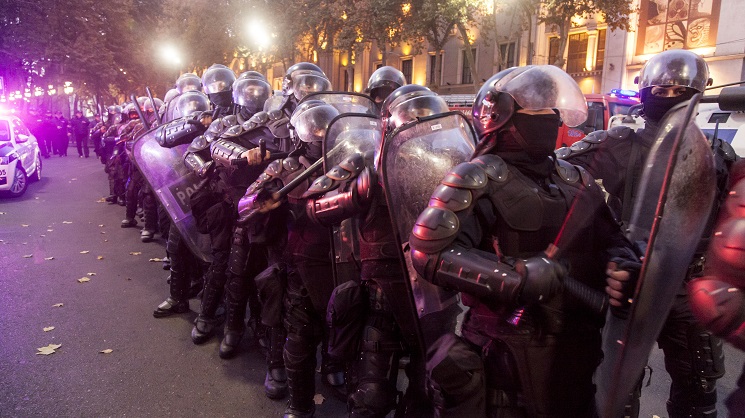Georgian ombudsperson names key human rights challenges on int’l Human Rights Day

Georgian Public Defender Nino Lomjaria previously chaired the International Society for Fair Elections and Democracy NGO. Photo: Public Defender’s press office.
Georgian Public Defender Nino Lomjaria has spoken about human rights challenges in the country on International Human Rights Day marked today.
In her statement Lomjaria touched upon the selection process of the judges for the Georgian Supreme Court, saying that “various problems have been identified” which could make an influence on the fair selection of the judges.
She stated that secret balloting in the High Council of Justice, in the body which is responsible for the selection and appointment of judges in the country, and the absence of a legal mechanism to dispute the decisions of the council, negatively influenced the selection process.
Right to assembly and manifestation
Lomjaria stated that the Interior Ministry did not make clear warnings before the rally dispersal in central Tbilisi on June 20.
She said that the dispersals of November 18 and 26 rallies were carried out only with the use of water cannons. “However, there are still question marks about the necessity of the use of force.”
Lomjaria stated that the lack of information led to the dispersal of a rally in Georgia’s Muslim-populated Pankisi Gorge in April 2019.
The public defender stated that police have not detained the individuals who organised anti-LGBT events in Tbilisi in the spring, saying that the reaction to individual facts of harassment were delayed.
 Parliament is scheduled to vote on Supreme Court judges on December 12. Photo: Supreme Court.
Parliament is scheduled to vote on Supreme Court judges on December 12. Photo: Supreme Court.
‘Informal ruling in prison’
Lomjaria says that there are privileged groups in prisons who make decisions on various disputes there.
She stated that it is the “ugly inheritance” of the institution of criminal bosses which must be addressed.
Pardoning of inmates
Lomjaria pointed at the presidential pardons in 2019 and stated that there were several cases when such individuals left the prison who did not deserve amnesty.
Lomjaria said that allowing the wrong people to leave prison creates threats for public.
Conflict-affected population
Lomjaria says that the closure of crossing points by occupation forces since September 4 has created a severe humanitarian situation on the ground, leading to deaths because of delayed medical care.
She stated that the release of videos from Tskhinvali prison earlier this year once again confirmed ill-treatment of inmates in Georgia’s Russian-occupied regions.
Lomjaria said that the government must use all levers to make the occupation forces release an abducted Georgian doctor Vazha Gaprindashvili.
 The ombudsperson touched upon recent rally dispersals in Tbilisi. Photo: Nino Alavidze/Agenda.ge.
The ombudsperson touched upon recent rally dispersals in Tbilisi. Photo: Nino Alavidze/Agenda.ge.
Sexual harassment
The ombudsperson welcomed the tougher punishment against sexual harassment in the work place.
She stated that more and more women have been contacting her office due to alleged harassment at work, adding that combating hate crimes remains a problem in the country.
Work safety
The ombudswoman says that in the first six months of 2019 alone, 71 people have been injured and 25 killed at the workplace.
She said that the government has taken steps to combat the problem. However, further measures are still needed, including the boosting of rights of work inspectors.
Access to healthcare
Quality of healthcare services and high prices on medicines have been named as major problems in this regard, as well as the lack of proper medical services in the regions.
High rates of cancer and the lack of a united national programme for oncology diseases remain a problem,” Lomjaria said.
Lomjaria has urged the government to take further steps against environmental problems, to upgrade the protection of people with disabilities, children and elderly population of the country.
 Tweet
Tweet  Share
Share